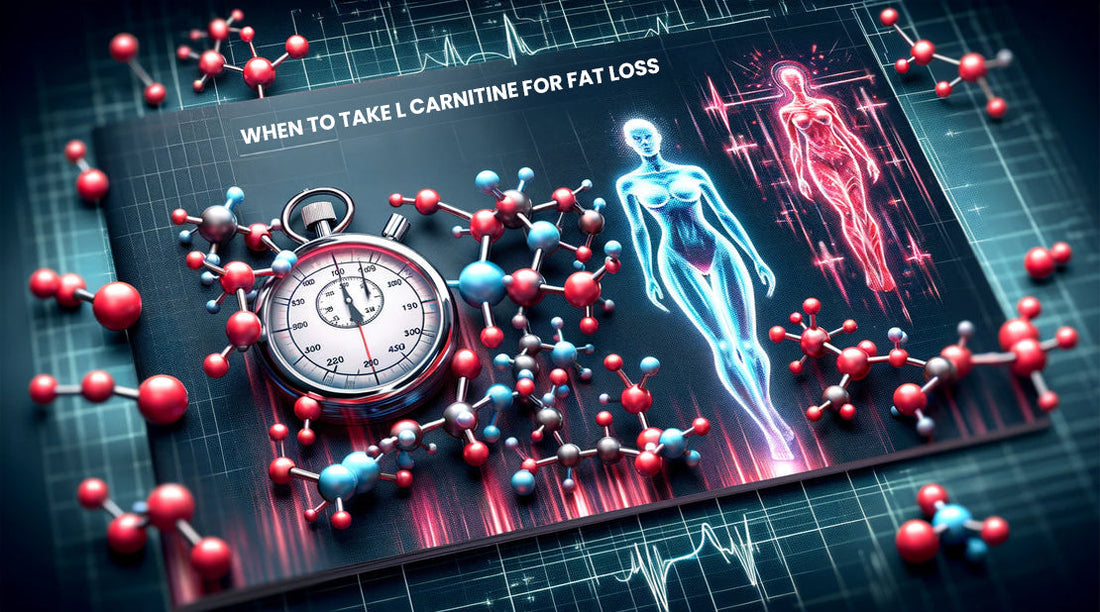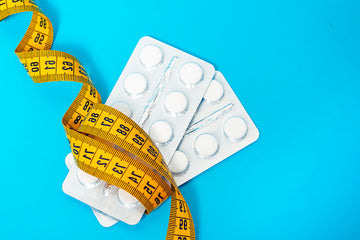

Best Time to Take l Carnitine for Fat Loss: A Comprehensive Guide
Table of Contents
In this comprehensive guide, we'll dive into everything you need to know when to take L-carnitine for fat loss. From its various forms and mechanisms of action to dosage recommendations and potential side effects, we'll leave no stone unturned.
If you're looking to shed some extra pounds, L-carnitine might just be the supplement you need. This naturally-occurring amino acid has been shown to promote fat loss when taken in conjunction with a healthy diet and exercise routine. But when is the best time to take carnitine for optimal results? And what other factors should you consider before supplementing with it?
By the end of this post, you'll have all the information you need to make an informed decision about whether or not L-carnitine is right for you.
What is L-carnitine?
L-carnitine is a naturally occurring amino acid that plays a vital role in the body's energy production. It is produced by the liver and kidneys and stored in muscles and other tissues throughout the body. The primary function of L-carnitine is to transport fatty acids into the mitochondria, where they are metabolized to produce energy. As a result, it is frequently used as a supplement to aid in weight loss and exercise performance. However, it's important to consult with a healthcare professional before adding L-carnitine supplements to your regimen to determine if it's suitable for you.
Different types of L-carnitine
L-carnitine is an amino acid-like compound that plays a vital role in the transportation of fatty acids into the mitochondria, where they can be used as an energy source. There are several different types of L-carnitine, including:
- L-Carnitine: This is the most common and basic form of L-carnitine. It is naturally found in the body and can also be obtained through diet.
- Acetyl-L-Carnitine (ALCAR): This form of L-carnitine is a modified version of L-carnitine that is more easily absorbed into the body. It is often used as a cognitive enhancer and to support healthy brain function.
- Propionyl-L-Carnitine (PLCAR): This form of L-carnitine is often used to support cardiovascular health. It has been shown to improve blood flow and reduce the symptoms of angina.
- L-Carnitine-L-Tartrate (LCLT): This form of L-carnitine is commonly used by athletes to improve exercise performance and reduce muscle damage.
- Glycine Propionyl-L-Carnitine (GPLC): This form of L-carnitine is a combination of L-carnitine and the amino acid glycine. It is often used to improve blood flow and support healthy cardiovascular function.
- D-Carnitine: This is an inactive form of L-carnitine that is not utilized by the body and is not recommended for supplementation.
How L-carnitine aids in fat loss?
L-carnitine performs several mechanisms of action that aid in the process of fat loss. It helps transport fatty acids to the mitochondria, where they are burned for energy production. This mechanism increases the body's energy production and reduces fatigue during exercise.
Additionally, L-carnitine can reduce muscle damage and soreness after exercise, allowing for quicker recovery. Supplementing with L-carnitine has also been found to improve insulin sensitivity, which may further aid in fat loss and diabetes prevention. Overall, these multiple mechanisms make L-carnitine a popular supplement for weight loss and exercise performance improvement.
Scientific evidence supporting L-carnitine for fat loss
Scientific studies have provided compelling evidence to support the use of L-carnitine for fat loss. As an amino acid that transports fatty acids into the mitochondria, L-carnitine plays a critical role in the body's ability to burn fat for energy.
Research has shown that supplementing with L-carnitine can increase the use of fat as fuel during exercise, leading to improved endurance and fat burning.
Furthermore, L-carnitine supplementation has been found to reduce muscle damage and soreness after exercise, allowing for quicker recovery and improvement in overall performance.
Additionally, studies have shown that L-carnitine can improve insulin sensitivity and aid in weight loss efforts. It is important to note that L-carnitine works best when combined with regular exercise and a healthy diet.
Factors to consider before taking L-carnitine for fat loss
· Health status
For individuals who have certain health conditions, it's important to consult with a healthcare provider before supplementing with L-carnitine. Those with kidney disease or diabetes should be cautious when taking L-carnitine, as it may interact with medications and worsen existing conditions.
Additionally, pregnant or breastfeeding women should avoid taking L-carnitine altogether due to the lack of data regarding its safety in these groups.
· Age and gender
It is crucial to consult with a healthcare professional before taking L-carnitine, especially if you have pre-existing medical conditions or are taking medication. Dosage and timing of L-carnitine supplementation may also vary based on individual factors such as age and gender. It is important to follow the recommended guidelines for optimal results.
· Diet and lifestyle factors
Regular exercise can also help to boost metabolism and aid in weight loss. Adequate sleep and managing stress levels are also important for overall health and weight management. It's recommended to consult with a healthcare professional before taking any supplements to ensure they align with your specific needs.
When to take L-carnitine for fat loss?
When it comes to taking L-carnitine for fat loss, timing is crucial.
The best time to take carnitine is before a workout as it can enhance your performance and aid in fat loss. Taking L-carnitine with meals can also be beneficial as it helps increase metabolism. However, it is important to follow the recommended dosage instructions and not exceed the suggested amount.
Keep in mind that results may vary based on individual factors such as diet, exercise routine, and overall health. So, it is essential to consult with a healthcare professional before starting any supplementation.
By considering these factors, you can effectively incorporate L-carnitine into your fat loss routine and achieve optimal results.

How to take L-carnitine for optimal fat loss results?
Here are some tips on how to take L-carnitine for optimal fat loss results:
- Timing: Take L-carnitine 30-60 minutes before exercise to help increase fat burning during the workout. Taking it with a meal may also help improve absorption.
- Dosage: The recommended dosage for L-carnitine varies depending on the individual, but a common range is 1-3 grams per day. It's best to start with a lower dose and gradually increase as needed.
- Form: L-carnitine supplements come in various forms, such as capsules, tablets, and liquid. Choose a form that is convenient for you to take regularly.
- Quality: Look for a reputable brand that uses high-quality ingredients and has undergone third-party testing for purity and potency.
- Lifestyle factors: L-carnitine supplements can help support fat loss, but it's important to also maintain a healthy diet and regular exercise routine to achieve optimal results.
It's also worth noting that while L-carnitine can be helpful for some people in their weight loss journey, it is not a magic solution. Consult with your healthcare provider before taking any new supplements, especially if you have underlying health conditions or are taking medications.
Animal-based sources of L-carnitine
Red meat, poultry, fish, and dairy products are some of the primary sources of L-carnitine derived from animal-based food. Among these, red meat is the richest source of L-carnitine, with beef containing up to 81 mg per ounce. Chicken breast and salmon also contain significant amounts of L-carnitine, with around 3-5 mg and 4-5 mg per ounce, respectively. Dairy products like milk and cheese are other animal-based options that contain smaller amounts of L-carnitine.
For vegans or vegetarians who do not consume animal products, plant-based supplements or food sources such as avocado, tempeh, and peanut butter can provide L-carnitine.
Plant-based sources of L-carnitine
- Tempeh
- Avocado
- Lentils
- Pumpkin seeds
- Whole-wheat bread
Frequently asked questions about L-carnitine for fat loss
- What are the different forms of L-carnitine available?
L-carnitine is available in various forms, including capsules, liquid, and powder. Capsules are the most convenient form as they are pre-measured and easy to consume. Liquid L-carnitine is absorbed quickly and may be ideal for those who have trouble swallowing pills.
- Can L-carnitine be taken on an empty stomach?
When it comes to taking L-carnitine, many individuals wonder whether it's best to take it on an empty stomach or with a meal. While L-carnitine can be taken on an empty stomach, studies suggest that taking it with food may facilitate better absorption. That being said, for those who prefer taking supplements on an empty stomach, L-carnitine is unlikely to cause any discomfort or adverse effects.
- What is the maximum recommended dosage of L-carnitine for fat loss?
In general, the recommended dosage ranges from 500-2000mg per day, split into multiple smaller doses throughout the day for improved absorption. It's essential to follow the recommended dosage and not exceed it to avoid any potential side effects that may arise with higher doses. Taking L-carnitine with food can also enhance its absorption and effectiveness.
The Best Time to Take Carnitine for Optimal Fat Loss
L-Carnitine is a valuable supplement to consider adding to your fat loss routine. Understanding the mechanisms of action, the best time to take carnitine, and dosage considerations are all important factors to consider before incorporating it into your diet. It's always recommended to consult with a healthcare professional before starting any new supplement regimen. With proper usage, L-carnitine can aid in weight loss while also improving exercise performance and cardiovascular health.
Check the best L-Carnitine Supplementation here!!!


















